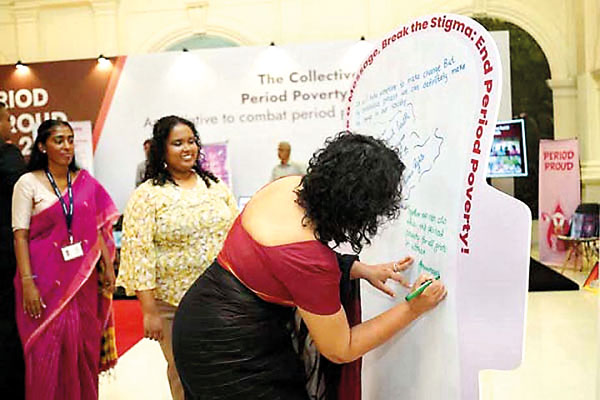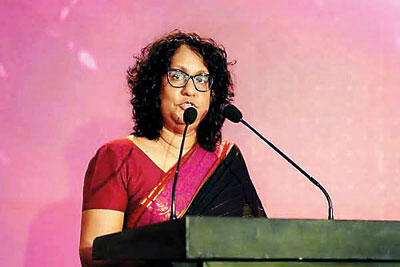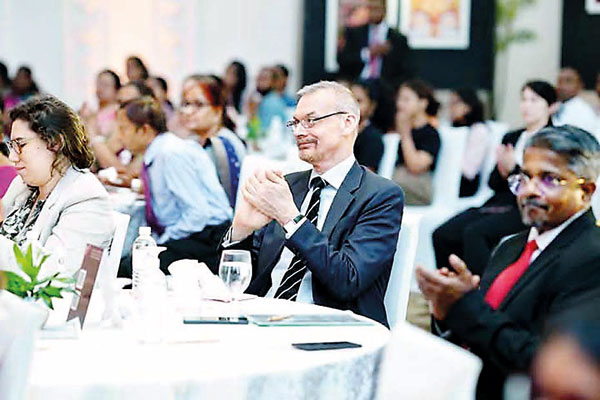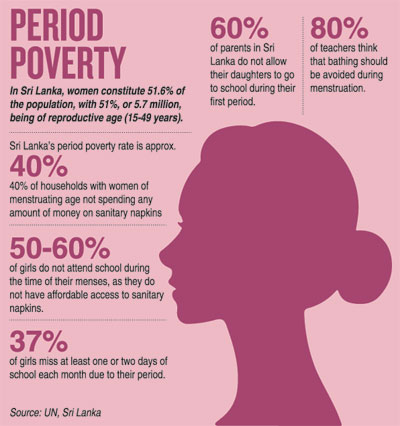News
Period poverty study finds multiple factors hinder women and girls
View(s):By Ishu Bandara
Period poverty and the myths surrounding menstruation remain serious challenges in Sri Lanka, badly affecting the dignity of the majority of women and girls, particularly in rural and estate communities.
The Family Planning Association of Sri Lanka (FPA Sri Lanka), in partnership with the Embassy of France in Sri Lanka and the Maldives, launched the Collective Action Against Period Poverty (CAAP) project to promote the inclusion and empowerment of menstruators, with a particular focus on improving access to menstrual hygiene education and awareness and addressing critical gaps in water, sanitation, and hygiene infrastructure, particularly in schools.
The launch was held at the Galle Face Hotel in Colombo with the presence of Prime Minister Harini Amarasuriya and Rémi Lambért, the Ambassador of France to Sri Lanka and the Maldives.

Prime Minister Harini Amarasuriya writes a message on the board, expressing her support for efforts to alleviate period poverty
Speaking at the launch of a study on menstrual hygiene and period poverty in Sri Lanka by the CAAP, Dr Amarasuriya stressed the urgent need to ensure that “menstruation does not hinder anyone’s health, education, or dignity”.
She said, “The latest research, focused on communities in Trincomalee, Kandy, and Colombo, lays bare uncomfortable truths: too many girls still miss school because they lack access to menstrual products; too many women turn to unsafe alternatives; and stigma continues to silence and isolate.

The premier addresses the gathering
This must change. We must act urgently and decisively to ensure that menstruation does not hinder anyone’s health, education, or dignity.”
Mr Lambért revealed that gender equality was one of the topics raised by Dr Amarasuriya during her visit to France in April 2025 and that it remains one of France’s main areas of cooperation with
Sri Lanka.
In his speech Mr. Lambért emphasised, “The CAAPP project has allowed us to collectively reflect on sustainable solutions with a positive and lasting impact on the lives of thousands of women and girls. The research and evidence generated by our partners will help shape long-term responses rooted in local expertise.”
The Executive Dairector of the FPA, Dr. Ruchitha Perera, said that this first project addressing menstrual hygiene and period poverty in Sri Lanka, implemented through CAAP, marks a significant milestone. He added that this pioneering effort was made possible through an inaugural collaboration with the Embassy of France in Sri Lanka and the Maldives.
The project was implemented across the Northern, Central, Eastern, Western, and North-Western provinces, with a particular focus on rural and marginalised communities, in collaboration with 13 organisations under CAAP.
A study on menstrual health and hygiene, particularly within the plantation communities of Kandy and Nuwara Eliya, revealed that the estate sector in Sri Lanka is a particularly vulnerable population, grappling with poor living conditions and inadequate sanitation facilities.
During interviews with women aged between 15 years and 49 years living in these communities, researchers found that most had limited knowledge about menstrual health and hygiene. Many expressed the belief that ‘menstruation is a way of passing bad blood from the body, which helps to keep the body clean and healthy’.
The study revealed that the lack of proper washing facilities contributes to absenteeism from schools and workplaces. Poor knowledge about menstrual health, unsafe disposal practices, and unhygienic menstrual management increase the risk of infections and cause environmental harm.
Many people continue to face shame and restrictions during menstruation due to traditions, religious beliefs, and misinformation. These challenges are further compounded in schools, where even some teachers follow or reinforce incorrect practices.

French Ambassador Rémi Lambért, whose country was a key sponsor of the event, is seen applauding a speech alongside other participants and guests
One teacher noted, “Most female students experience abdominal pain and remain seated out of fear of leakage and staining their white uniforms.” A male teacher added, ”I believe that placing a dustbin encourages students to dispose of used sanitary materials, which I see as problematic. Therefore, I oppose keeping a dustbin in the toilet. In fact, I feel that female students should avoid coming to school during their menstrual periods altogether.”
A male principal said, “I have noticed a significant decline in female student attendance during menstruation. The white uniform is part of the problem.”
A welfare officer explained the burden faced by estate workers: “Although estate workers in the hills may take short breaks during work, they must pluck at least 20 kilograms of tea leaves to earn their full daily wage of 1,000 rupees.”

The study also found that socio-cultural norms, deeply rooted perceptions, and traditional beliefs have a significant negative impact on all participants in the area. Cultural restrictions and stigma were prevalent among women and girls, affecting their daily lives, education, and self-esteem.
Many female participants shared the restrictions they face during menstruation, often rooted in traditional beliefs and cultural taboos.
One participant explained, “We were not allowed to enter the prayer room. Even our teacher did not let us attend assembly prayers. We had to sit separately, which made the boys giggle and bully us. Some teachers didn’t even allow us to wear ash powder on our foreheads.”
Another shared: “My mother and grandmother don’t allow me to go near the men in the family, including my father, brother, and even my own sons. They believe that touching them would harm them. We’re not allowed to water the vegetable garden or touch plants, and if we touch a newborn, they believe the baby will cry through the night.”
A third participant said, “We’re not supposed to go near the cattle shed during our periods. They say the cattle will get ticks and fall ill. We’re also not allowed to touch pets.”
However, all participants stated that they continued to pluck tea leaves despite menstruating.
The best way to say that you found the home of your dreams is by finding it on Hitad.lk. We have listings for apartments for sale or rent in Sri Lanka, no matter what locale you're looking for! Whether you live in Colombo, Galle, Kandy, Matara, Jaffna and more - we've got them all!

